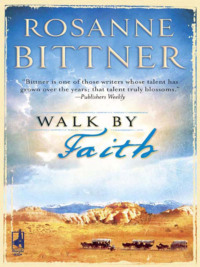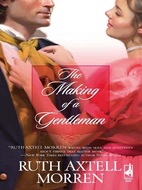Książki nie można pobrać jako pliku, ale można ją czytać w naszej aplikacji lub online na stronie.
Czytaj książkę: «Walk By Faith»
Praise for
ROSANNE BITTNER
and her novels
WALK BY FAITH
“This standout novel is truly in a class of its own.”
—Romantic Times BOOKreviews
“Bittner shines with this new inspirational historical!”
—Literary Journal
WHERE HEAVEN BEGINS
“Bittner brings to life the dangerous and beautiful Alaskan wilderness of the gold rush days. Clint is a hero who’ll pull at your heartstrings.”
—Romantic Times BOOKreviews
“Rosanne has written a truly inspiring high adventure that will invigorate your senses and reaffirm your faith in God’s wisdom.”
—Affaire de Coeur
FOLLOW YOUR HEART
“Bittner’s characters spring to life…extraordinary for the depth of emotion with which they are portrayed.”
—Publishers Weekly
“True-to-life characters who stay with you long after you’ve turned the last page!”
—Los Angeles Daily News
Walk by Faith
Rosanne Bittner
MILLS & BOON
Before you start reading, why not sign up?
Thank you for downloading this Mills & Boon book. If you want to hear about exclusive discounts, special offers and competitions, sign up to our email newsletter today!
Or simply visit
Mills & Boon emails are completely free to receive and you can unsubscribe at any time via the link in any email we send you.
Dedicated to my mother-in-law,
Florence Irene Umphrey Bittner, better known
to the whole family as “Grandma Bittner,”
who lived to the ripe old age of 101. Until she
had to go into a nursing home in her late nineties,
Florence attended Midway Baptist Church in
Watervliet, Michigan, faithfully every Sunday
morning, as well as often attending Sunday evening
services, Wednesday evening services and most other
church functions, in spite of bouts with breast
cancer, colon cancer, two broken hips and arthritis
that finally put her in a wheelchair. Even when using
walkers and a wheelchair, she still attended church.
Though a host encamp against me,
My heart shall not fear;
Though war arise against me,
Even then, in this will I be confident.
For in the day of trouble
He will hide me in His shelter;
In the secret place of His tent will He hide me;
He will set me high upon a rock.
—Psalms 27:3, 5
Contents
Chapter One
Chapter Two
Chapter Three
Chapter Four
Chapter Five
Chapter Six
Chapter Seven
Chapter Eight
Chapter Nine
Chapter Ten
Chapter Eleven
Chapter Twelve
Chapter Thirteen
Chapter Fourteen
Chapter Fifteen
Chapter Sixteen
Chapter Seventeen
Chapter Eighteen
Chapter Nineteen
Chapter Twenty
Chapter Twenty-One
Chapter Twenty-Two
Chapter Twenty-Three
Chapter Twenty-Four
Chapter Twenty-Five
Chapter Twenty-Six
Chapter Twenty-Seven
Chapter Twenty-Eight
Chapter Twenty-Nine
Chapter Thirty
Chapter Thirty-One
Chapter Thirty-Two
Chapter Thirty-Three
Chapter Thirty-Four
Epilogue
Chapter One
March 16, 1862, St. Louis, Missouri
Clarissa was not sure where she’d found the strength to get dressed and open Seaforth’s Dry Goods this morning. She felt numb with worry, not for her husband’s safety, but for where he might be…and what he might be doing. She set items on the counter to fill the last of a customer’s order.
“There you are, Mrs. Shelby. I think that’s everything. That’s two dollars.”
“Oh, my!” The older woman put a wrinkled hand to her chin. “Put it on my bill, Clare dear, will you? My husband will be by to pay it. And can you wrap it for me?”
“Certainly.” Clarissa wrote the woman’s name on the tab and added “Owed.” Like her father had always done, she extended credit to most hometown customers. Until his sudden death three years ago, Henry Seaforth ran this store most of his life. Then Clarissa married Chad Graham, who took over the store and had run it ever since so that she could stay home with their precious little girl, Sophie.
She pulled a length of brown paper from its roll and tore it off to wrap Mrs. Shelby’s items, resentment toward Chad growing as she silently packed the order. It was because Chad was her baby’s father that Clarissa had struggled to ignore rumors of her husband’s infidelity over the past two years. Now, this morning, the reality of those rumors was burrowing deeply into her mind and heart. Apparently she could no longer avoid the awful truth, though she still did not want to believe it.
Chad was gone. So were all his clothes. Where was the man to whom she’d given all her love, her faith, her trust, her virginity, her heart? Where was the man who was now the legal owner of Seaforth’s? That’s how much she’d trusted him. This business that was her father’s life now belonged to the man her father warned her before he died not to marry. Now that man was missing.
She’d even given up a nursing career for Chad. Getting into Washington University here in St. Louis had not been an easy task for a woman. She’d had to settle for nursing rather than becoming a doctor, but at least she’d made it that far. Then she gave up her nursing job at St. Louis City Hospital when she learned she was expecting Sophie.
The terrible unrest and sometimes-violent street fighting that occurred almost daily now over the war between North and South was enough to worry about. How could Chad disappear at such a dangerous time, with Federal troops swarming the streets and guarding the St. Louis Arsenal, and with Missouri Confederate militia still hiding in the southern part of the state and attacking northern sympathizers at every opportunity? St. Louis was filling up with families who’d fled battlegrounds or who’d been routed out by rebel raiders. And the hospital was becoming crowded with wounded men, from both North and South. She wished sometimes that she could help them out with her nursing experience, but Chad wanted her to stay home with Sophie.
A lot that helps now, she thought. She tied string around Mrs. Shelby’s wrapped items, yanking on them with secret anger. With Chad gone and this store their only means of income, she had to handle things alone until she found out what had happened to her husband.
She handed her customer the package. “Thank you, Mrs. Shelby.”
“And where is that precious little girl of yours?” the woman asked. “Chad is usually the one who waits on me, you know.” She put a hand to her chest. “My, what a handsome man you married! It’s a good thing you are so exceptionally beautiful, young lady, or half the women in this town would be trying to steal that man from you,” she teased. The aging woman chuckled. “If I’d been younger, I certainly would have tried for him myself before he up and married you.”
Her heart aching inside, Clarissa managed a smile. “Thank you. Chad is on a business trip,” she lied.
“Well, you shouldn’t have to watch this store. That young man should have found someone else to do it. You’re a mother now. Little Sophie needs you more than this store does. And with those Home Guardsmen prancing around out there, threatening any person who dares to talk of secession, who knows what will happen next in this city. It’s no longer safe for woman or child.”
“We’re fine, Mrs. Shelby. Sophie is with the Harveys. Carolyn Harvey agreed to watch her so I could work today. Sophie likes to play with their little girl, Lena. And I’m not about to let this senseless war force me to close down and lose business, especially now that it belongs to me and my husband.”
“Oh, of course, dear, but it just doesn’t seem right for a mother to work. I hope Chad will be home soon.”
Clarissa turned away. “So do I.”
“What’s that, Clare?”
“Oh.” Clarissa turned. “I just meant Chad wasn’t sure how long he’d be. He took a train to Chicago to see about getting more stock for cheaper prices.”
“Well, wouldn’t you know? I was in here just two days ago, and that man never said a word about taking a trip.”
He never said a word to me either, Clarissa thought.
Mrs. Shelby smiled. “I’ll see you in church tomorrow?”
Clarissa nodded. “Yes, ma’am.”
Mrs. Shelby left, and Clarissa breathed a sigh of relief, glad she wouldn’t have to come up with any more explanations. The ominous sight of Chad’s empty wardrobe hit her again like a knife in her heart. For months he’d not shown as great an interest in her as when they’d first married. She’d blamed it on the time she needed for Sophie after she was born, and the weight she’d gained. Still, she’d soon lost all that weight. When she looked in the mirror she saw the same slender woman Chad Graham had married. There was no premature gray in her deep red hair. Nothing about her had changed, and she’d given Chad such a beautiful, charming, red-haired little girl of whom he could be so proud.
But something was wrong…something she’d refused to face in spite of the warning a few months ago from old Rachael Grimes, a founding member of the Light of Christ Church, where Clarissa had attended since she’d been a young girl. She’d even met Chad there, when he was new in town and began attending in order to meet people.
Rachael Grimes was also one of the town’s biggest gossips. Your husband has been unfaithful, dear. You must be doing something wrong that has driven him from you. Don’t you let that man get away and don’t let him wrong you. You talk to him and find out what you need to do to keep him in your own bed.
The words still stung. She’d loved Chad with her whole being, falling head over heels when he began teaching the young-adult Sunday school class. Chad was strikingly handsome, with his sandy hair and green eyes, solid build and sparkling smile. He was smart, had a good job at the bank, dressed impeccably and was a social hit with everyone. Half the young women in church had vied for his attention, but it was Clarissa who’d won it.
Chad had been so attentive and sympathetic when her father suddenly died of a heart attack. It was a dark time for her. Her mother died years earlier, and Henry Seaforth had been Clarissa’s whole world. Chad stepped in and comforted her, reading scripture to her, consoling her—attention that led to something much more. He’d sworn his love for her, asked her to marry him. She’d barely had time to recover from her father’s death before she was walking down the aisle of the Light of Christ Church as Chad Graham’s bride, in spite of her father’s distrust of the man.
Her wedding night with Chad, and many nights thereafter, had been blushingly passionate, and her whole world became Chad Graham. Within just ten months she’d added little Sophie to that world. Chad had taken over running the store, and because of his friendly, social nature and his knowledge of accounting, he ran it well.
Everyone liked Chad, but her father had thought Chad’s background was too obscure. So did her good friend Carolyn Harvey. But Carolyn and her husband, Michael, were wonderful Christian people who were willing to give Chad the benefit of the doubt, since Clarissa was so much in love and Chad had become so active in the church. Chad claimed to be an orphan from Chicago, who’d struggled and worked to make something of himself and whose faith in Christ had helped him through the bad times. He’d seemed so sincere and dedicated.
Now her father’s and Carolyn’s warnings haunted Clarissa, as did old Mrs. Grimes’s hurtful words. If the woman was right, why did she think that whatever Chad might have done was Clarissa’s fault? The thought of somehow being responsible hurt deeply and made her feel painfully inadequate as a woman. She’d married Chad blindly, her heart so full of love and passion that nothing else mattered. In her mind she’d been the best wife and mother she could be. Why on earth would Chad ever want to leave her?
The bell above the front door jingled as someone came inside then, and Clarissa turned to see Margaret Baker, one of the founders of the Light of Christ Church. The woman’s dark eyes drilled into Clarissa as though she’d done something terrible.
“Hello, Margaret.” Clarissa greeted the woman with a smile. She and Margaret’s daughter, Susan, had attended school together and were often involved in the same activities at school and church. “What can I help you with today?”
Margaret came closer, looking so angry that it changed her whole countenance into a stern, stiff, almost witchy air. She raised her chin as she spoke.
“You can bring back my Susan!”
Clarissa frowned. “What do you mean?”
“I mean that you can straighten up and be a proper wife so that you don’t drive your husband into another woman’s arms and drive my daughter to sin in the eyes of God!”
A horrible picture began to take form in Clarissa’s thoughts. She felt as though her blood was draining from her brain down and out through her feet. “I have no idea what you’re talking about,” she answered.
“Don’t you? Where is Chad, Clare? Do you know where he’s gone?”
“He’s…on a business trip.”
Margaret sniffed back tears and handed her a folded piece of paper. “Wake up!” she seethed. “This is from Susan.”
With now-shaking hands Clarissa took the paper and opened it.
Dear Mother,
Please forgive me, but I am totally in love with Chad Graham. Chad loves me, too, and now I am carrying his child.
We have left St. Louis to share our lives together. As soon as Chad can get a divorce, we will be married. I have loved Chad since before he married Clare. Chad will sell the store, and with that money we will start a wonderful new life together.
I know this is right, Mother. I feel it in my heart. Chad has never been happy with Clare, but I make him happy. After we are married and the baby is born, I will let you know where we are. I hope you will come and visit.
All my love, Susan
Stunned, Clarissa felt faint. She handed back the letter. “Why on earth are you angry with me?” she asked Margaret. “Your daughter and my husband have committed adultery! Susan is pregnant by a married man who is currently still married to a woman who used to call Susan her friend!”
“Surely you knew my Susan loved Chad when you turned around and married him yourself!”
“No, I didn’t know!”
“I don’t believe you! And it serves you right to learn that Chad only married you because he needed this store! You threw yourself at him and used this store as a way to catch him, and now he will profit from it!”
A lump began to form in Clarissa’s throat and she turned away. The reality of the kind of man Chad really was hit her like a club slammed into her stomach.
Divorce! Susan said Chad was going to get a divorce! Had he already sold the store out from under her? How could she face anyone in town or at church if she was a divorced woman? What would people think of her?
Such shame! Such utter betrayal! Such deep, deep hurt she’d never known.
“Get out,” she told Margaret.
“Gladly! And I hope you’re proud of yourself, hurting my poor Susan by marrying the love of her life!”
The woman stormed out. Clarissa realized Margaret was defending Susan as a mother would, not wanting to face the sin of what her daughter had done. Still, Clarissa could hardly believe the woman could stand there and spout her daughter’s innocence in the ugly affair. And ugly it was. The realization of what Chad had done even made him seem ugly now! Behind that handsome face and those fetching green eyes lay pure evil, an evil that had cost her her trust, her pride, her means of living and maybe even her faith. Right now she felt God had abandoned her.
She managed to walk to the front door, close and lock it. She turned the Closed sign toward the street and pulled down the shade. She could not face one more customer today. How could she face anyone ever again?
Chapter Two
April 7, 1862, Tennessee
“If there’s a hell on earth, Lieutenant, this is it.”
First Lieutenant Dawson Clements nodded in agreement. He sat huddled behind a mobile cannon with Sergeant Jared Bridger listening to the hideous screams and groans of the thousands of wounded who lay sprawled among thousands more dead soldiers.
“They say Shiloh is a biblical name meaning ‘place of peace,’” Dawson told the sergeant. He shivered, pulling his rubber poncho up over his head against the cold rain. “Pretty ironic, isn’t it?”
Both men were painfully hungry, and neither had slept all night, mostly because of the haunting cries of the unattended wounded and the stench of blood that ran past them in rivulets along with the rainwater. Behind them, thousands more Union soldiers made temporary camp at Pittsburgh Landing, waiting for the arrival of relief troops.
“Grant says Buell will be here soon with a good seventy-five-hundred relief troops,” Dawson told his sergeant. “Come sunup we’ll push those Rebels clear back past that little church and get this over with.” He watched Sergeant Bridger pull his ragged wool blanket over his head and felt bad that rubber ponchos were given only to the higher officers. The fact that he and the sergeant sat here talking alone was not particularly proper army protocol, but nothing about the past twenty-four hours had been normal or proper. They were simply taking advantage of this chance to rest and gear up for what looked to be another bloody onslaught a couple of hours from now, when the sun would rise on the horror in the fields around Shiloh, and General Grant would lead a new march to take back what the Confederates had claimed earlier today.
“I’ve never seen anything like this, sir. In all our battles out west against the Apache, the Comanche, the Cheyenne—none of it can compare to this slaughter. I’ve seen men walking around still alive with their guts hanging out, bodies on the ground with no heads, an arm with no body nearby. It will be a long time before I can go to sleep without the cries of those boys ringing in my ears. I’d rather be back out west.”
Dawson rubbed his eyes. “Well, we’ve got to go where they send us, Sergeant Bridger. That’s what happens when you’re dumb enough to join the army in the first place.”
Bridger chuckled. “I do wonder sometimes why I got myself into this mess.”
Dawson shifted to relieve a sore hip caused from a horse falling on him earlier in the day. “I know why I did. It was because I had nothing else to do with my life—no home, no family, no goals—”
And because I’d left a man behind me to die. For one quick moment a flash of memory from the day he’d run away actually made him wince.
“I was thirteen when I joined,” he continued. “I was big for my age so they believed me when I said I was sixteen. I fought in the Mexican War at fourteen years old, saved a major’s life and that major’s family had money. He sent me to Philadelphia to get a decent education and then made sure I was gradually promoted to where I am now. He was killed by Indians, and I still think about him. He did a lot for me, probably the only person in my life who ever cared if I succeeded at anything.”
Bridger frowned. “Sir, why are you telling me all this?”
Dawson shrugged. “Maybe because I know I might be dead in a couple of hours. Such thoughts make a man do and say things he never would normally.”
The sergeant grinned. “Maybe so.” He reached inside his Union blue jacket and pulled out a piece of paper. “Which prompts me to give this to you.”
Curious, Dawson took the paper. “What’s this?”
“It’s my will.”
“Your will?”
The sergeant nodded. “For what it’s worth.”
“Why are you giving this to me?”
Bridger moved closer to the dwindling fire, the hot coals having a hard time keeping up with the rain. “Because earlier today you bayoneted a Graycoat who was about to shoot my head off. We were so busy fighting I never had a chance to thank you, sir, but I am grateful. I want you to know that. I have some money in a bank in St. Louis, and I’ve got no family left, so in case I’m the one who ends up with his face in the mud later today, I want somebody worthy to have my money. It’s not a whole lot, but enough for a man to get a pretty good start in life. I hope you can put it to good use.”
Dawson put the note into his own pocket without reading it.
“Don’t you want to know how much I’ve got?”
“No, because it won’t matter,” Dawson said. “You’re going to be just fine, Sergeant Bridger. You’ll end up back out west with me once this war ends.” He leaned against a wheel of the cannon cart. “Tell me, how did a man on sergeant’s pay manage to save up any money at all?”
A patient inside a nearby hospital tent let out a gut-wrenching scream that quieted both of them and sent shivers to Dawson’s very bone marrow. He closed his eyes and shook his head. “Another man has lost a limb, most likely.”
More screams came from the tent, and in the distance the continued groans and sobbing of other wounded men pierced the dark night. Dawson’s face burned from black powder that seemed to eat into his skin, and his eyes stung from it washing into them because of the rain, which the wind drove into his face in spite of the brimmed hat and the poncho he wore.
“Well, sir, to take your mind off that poor fellow in there, I’ll tell you how I came to have that money. It came from my grandma.”
“I thought you said you had no family.”
Bridger chuckled. “I didn’t know I did. My ma was good to me, but she was…well, let’s just say she never knew who my pa even was. Funny how we’ve fought together out west and now here, but we never knew all this about each other. Anyway, I grew up helping out in a saloon where Ma worked, and when she died I joined the army—kind of like the reason you joined, I guess. Anyways, low and behold I got this letter about six months back from a woman who claims to have been my grandmother. I don’t know how she found me, but she did. Come to find out, she lived in the same town where I grew up, St. Louis, Missouri. She wrote that her and my ma never got along, so I was never told about who she was or where she lived. The letter said she was soon to die of cancer and she wanted me to have some money she’d saved from working two jobs in her old age. Said it helped her passing to know somebody carrying her blood would go on in this life and maybe be a better person than she or my ma ever were.”
Dawson nodded in understanding, thinking how young Bridger was for being a sergeant; but then this war seemed to spur promotions that would never normally be given. Men were badly needed, and those with the slightest bit of army knowledge and any kind of schooling rapidly became in charge of the others. He was himself just twenty-nine, but before this war ended he could end up a general. He’d seen other colonels and generals who were barely any older.
“Anyway,” Bridger went on, “I couldn’t think of one other person than you who ought to have the money in case I die. It’s in the Federal Bank of St. Louis. So, if something does happen to me, it’s yours. Just make sure there’s a grave site someplace in St. Louis with my name on it, even if my body isn’t there. Just something that shows I once existed. My name and birth date are on that piece of paper.”
Dawson reached out and touched his arm. “I’ll do that, Sergeant, but like I said, you’re going to be just fine.”
Bridger sighed. “I sure hope so, sir. I just—do you believe in God, sir?”
The question caught Dawson off guard, and it brought back painful memories. He could still see Preacher Carter’s face plain as day, his scowl, his piercing dark eyes and sharp nose, his face red from giving Dawson another beating with his wide, black belt, screaming that he needed to “beat the devil” out of him again.
“Sure I do,” he answered Bridger, only because he knew that was what the man wanted to hear. “Why?”
“Well, I mean, do you really think a man goes to heaven when he dies, where everything is beautiful and peaceful and all that?”
Dawson decided this was not the time to tell a man there was also a hell, where some men, including himself, were bound to go no matter what. The worst part was that Preacher Carter would probably be there, too.
“Of course there’s a heaven,” he answered, forcing himself to sound positive, “but you’ll be an old man before you get there.”
“Lieutenant Clements!” A young private ran up to salute Dawson, interrupting the conversation. “I was told by a Major Coldwell to tell you to prepare the men and artillery for attack. We’re going to sweep this whole area clean of Rebels forthwith! General Grant is mustering all troops as well as the new arrivals, sir.”
“They’re here then?”
The private grinned broadly. “Yes, sir! All seventy-five hundred of them! They’re coming off the steamboat right now at the landing!”
Dawson saluted in return. “Thank you, Private. Tell the major we’ll have our cannon and rifles ready.”
“Yes, sir!” The private hurried away, excited now that it looked like enough help had come to turn this battle around. Dawson heard a man crying bitterly inside the hospital tent, and he supposed it was the same man who minutes ago had screamed in agony. For all he knew, after the next few hours of fighting he’d be missing a limb himself, or worse.
He stood and nodded to Sergeant Bridger. “Thank you for thinking of me, Sergeant. Go and prepare your men.”
The young man stood up with a tired groan, and the two men saluted one another. “Yes, sir.”
Their gazes held a moment. “God be with you, Sergeant,” Dawson told him, sure he detected a trace of tears in Bridger’s eyes.
“And with you, sir. Once this is over we’ll—”
A shot rang out before Bridger finished the sentence. His body lurched forward and fell, just missing landing in the campfire. In his back was a bloody, gaping hole.
Startled, Dawson watched a wounded and badly bleeding young Confederate soldier crawl toward him, a smoking pistol in his hand. It took Dawson a moment to realize what had just occurred.
While the wounded soldier fumbled with his pistol, Dawson quickly grabbed his musket, bayonet attached, from where it rested against a nearby log. Swiftly he jammed the tip of the bayonet against the Confederate man’s forehead. “Don’t bother reloading, mister!” he warned.
The young Rebel looked up at Dawson and grinned. “At least I got one more of you yellow-bellied Yanks before I meet my Maker.”
“And meet your Maker you will!” an enraged Dawson answered. He pulled the trigger of his loaded musket, wiping away not just the man’s grin, but nearly his entire face. Never in his life had he considered committing such a heinous act, but in this moment of pain and disbelief, he didn’t care.
Grief washed over him with the cold rain when he managed to turn his gaze to the young man who’d just willed him what little money he had in the whole world, and all because he’d saved his life earlier today. This time he’d failed him. He’d promised that boy that he’d be all right, but then such promises were only for God to make.
He knelt and gently he turned Bridger’s body over, hoping beyond hope that he might still be alive.
“Sergeant,” he spoke, a sob engulfing him at the same time. He felt at the man’s neck for a pulse, but there was none. He struggled to keep from breaking into all-out tears over the man’s shockingly sudden death, as several men gathered to see what had happened.
“Sir, are you all right?” someone asked.
Dawson nodded. “Go away—all of you,” he told them gruffly. “Get ready for the advance.”
“Yes, sir. What about Sergeant Bridger? We can’t bury him right now, sir. Grant is ordering—”
“I know what we have to do!” Dawson barked. “I’ll be along!”
“Yes, sir.”
Dawson sensed the men leaving. Dawn was barely breaking, and men who’d lain wounded all night still cried and groaned throughout the surrounding woods and orchards. How strange that he should feel so sad over the death of a young man he’d known only as a fellow soldier for the past year and a half. Preacher Carter had been right. Maybe he was evil and deserved this constant punishment.
He removed his rubber cape and laid it over the sergeant to keep his body dry and respectfully covered until he could return and bury the man. Feeling numb and strangely removed from reality, he headed for duty. There was a little church situated somewhere south of them, and their goal was to reach it before the sun set again.
The cold rain began soaking his blue greatcoat and running down his neck under his shirt. He thought it only fitting and proper that he should suffer from its chilling wetness. The discomfort would help shroud his inner pain for the next few hours.
When I was in trouble, I called to the Lord,
And He answered me.
Save me, Lord, from liars and deceivers.
—Psalms 120:1-2
Darmowy fragment się skończył.









